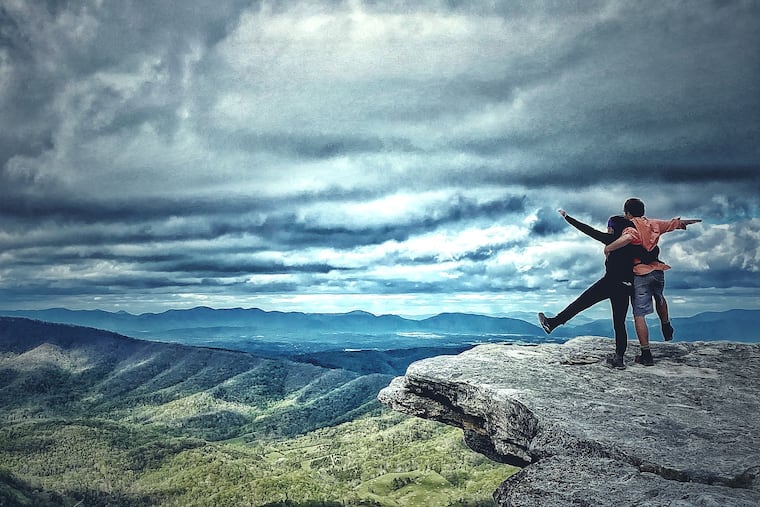What it’s like to spend the coronavirus pandemic hiking the Appalachian Trail
A couple from the Philly suburbs trudged 2,200 miles from Georgia to Maine while most everyone else was staying at home.

Kera Passante and Bill Welch were just 19 days into the journey of their lifetimes — hiking the Appalachian Trail from Georgia to Maine — when the pandemic’s shadow fell across their path.
The Chester County couple, both of whom are experienced hikers, prepared for more than a year to make the nearly 2,200-mile, 14-state trek. In February, they moved out of their Malvern apartment, put their stuff in storage, and arranged leaves of absence from work. After flying to Atlanta March 3, they arrived at the trailhead the next day and started what they hoped would be an extraordinary experience.
It’s been all that and then some. An urgent notice posted online March 23 by the Appalachian Trail Conservancy implored “thru-hikers” and day hikers alike: Please stay off the Appalachian Trail. The conservancy warned of infection risks among hikers using facilities along the route, and to hikers and others patronizing off-trail businesses. The website has since been updated with an advisory for those who are using the storied footpath as restrictions have eased in some areas.
“We heard about [the March 23 warning] a few days later when we went into Hot Springs, N.C., to resupply,” recalled Passante, 32, a therapist and yoga instructor who grew up in Kennett Square. “We made a pros and cons list. We ran through scenarios and every possible decision. We talked to our families and our friends. We talked about it for days.”
Like others among an estimated several hundred thru-hikers already en route in March, the pair decided to push on. Welch and Passante are taking precautions: sleeping in their tent (aka the “cuddle cave”) instead of in shelters, sanitizing, wearing masks when off the trail, and spacing those resupply missions over seven — rather than three or four — days.
“It actually eases my mind a lot that she’s safe on the trail and away from the pandemic,” said Passante’s mother, Sandi. “It’s the safest place she could be at this time.”
Last week, expecting to reach the trail’s northern terminus atop Mount Katahdin no later than the end of August, the couple said they’re glad to have stayed the course. They’re grateful for what hikers call “trail magic” — the physical, emotional, and even spiritual experience of simultaneously going deep into the American wilderness, and oneself. And they want to figure out a way to help others, including less advantaged individuals, have that experience.
“We want to tell a story that inspires others, not because we are hiking 2,200 miles, but because no matter how many obstacles ... there’s always a way,” said Passante.
“You can have a dream, and you can accomplish it,” said Welch, a 34-year-old auto detailer from West Chester. “I really don’t think there was a time when we thought, ‘This is too hard, and we want to go home.‘”
The two met at a rock-climbing gym in Coatesville five years ago; their roots in the Philly region have earned them the trail nicknames Always (Welch) and Sunny (Passante). Fewer hikers means fewer chances for the serendipitous camaraderie that’s integral to “AT” culture. But Passante and Welch have made friends and been embraced by so-called trail angels who live near certain landmarks and are known for giving hikers shelter or sustenance.
Despite some social media pushback against those who resisted warnings to leave the trail, in the real world “people have been so generous, and so kind,” said Passante.
More than 600 people are following the couple’s adventure on Facebook, including members of the Philly cycling community like music therapist Aileen Elizabeth Bunch of Collingswood.
“What a lifeline [Passante and Welch] have been for a lot of us who are cooped up here,” said Bunch. “Seeing them pop up in my news feed gives me hope. At a time of so much negativity, it’s amazing to see them living their dream.”
An uplifting outlook certainly does pervade their Facebook, Instagram, and other social media postings, where vivid photos of breathtaking vistas, exquisite flora, unusual fauna (a young bull moose), and exuberant faces predominate. But the two also have encountered snow, hail, ice, unexpected rain, and fog so dense it utterly shrouded legendary scenery they’d looked forward to seeing.
“It’s not all bonfires and s’mores,” Welch said. “Much of the time you’re walking through what hikers call the green tunnel. You’re walking for miles and miles on a path that’s a foot wide and overgrown and surrounded by green.
“At other times you’re walking straight up sheer rock faces. We’ve had paved surfaces under our feet, or miles of boulders, sometimes swamps, and sometimes mud.”
At other times, however, Welch and Passante have enjoyed beauty so sublime, air so pure, rushing water so crystalline that words and images can’t fully convey. Spending hour after hour, day after day in the company of one’s partner, and oneself, has a way of putting even a pandemic into perspective.
“I don’t feel like we’ve hit ‘pause,’” Passante said. “I feel like we’ve hit ‘play.’ It doesn’t feel like an escape out here. It feels like we are living fully.”
Said Welch: “Now is the time to move forward and push on — not to go back to what was.”